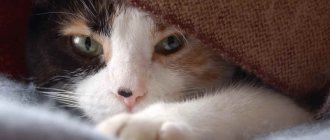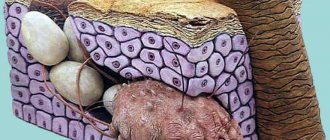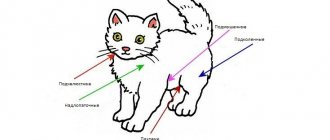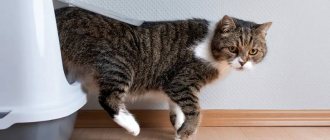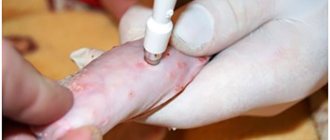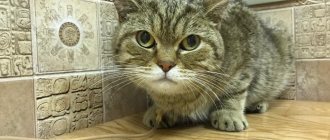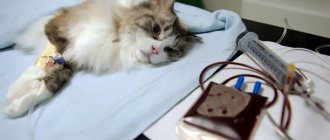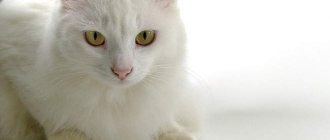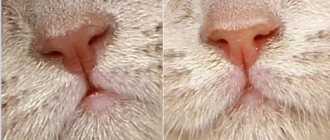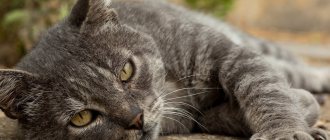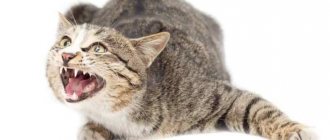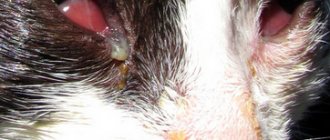Vitamin deficiency is a disease caused by a lack of certain vitamins in an animal's diet. It can occur in cats of any age and breed, and there is no genetic predisposition to this disease. Believing that vitamin deficiency does not pose any danger, many owners are seriously mistaken.
Read in this article:
- Causes of vitamin deficiency in cats
- How does the disease manifest?
- Vitamin A
- Vitamin B
- Vitamin C
- Vitamin D
- Vitamin E
- Vitamin K
- What is the danger of vitamin deficiency in cats?
- Prevention of vitamin deficiency
Causes of vitamin deficiency in cats
In 70% of cases, vitamin deficiency in cats occurs due to an unbalanced diet. If you feed an animal only fish or only meat, then its body does not receive the full range of nutrients with the exception of proteins.
A lack of a certain vitamin can be caused by: exclusion of fresh vegetables and herbs (for example, lettuce leaves) from the diet, feeding the cat exclusively with ready-made food, and the predominance of canned and smoked foods.
Other reasons that can cause vitamin deficiency:
- Parasites. Ticks and other blood-sucking insects can provoke not only anemia, but also a lack of certain vitamins;
- Gastrointestinal disorders. Among them: ulcers, gastritis, acute colitis, etc. They disrupt the absorption processes of vitamins, which leads to their obvious deficiency;
- Parasitic diseases. Helminths in the pet's body absorb most of the incoming vitamins.
Less commonly, vitamin deficiency develops as a result of infection, endocrine diseases, and cancer.
Factors causing vitamin deficiency
Veterinarians name several reasons that contribute to the development of vitamin deficiency in cats. Some of these factors play a dominant role in the onset of the disease, some play a smaller role, but taken together, each of the reasons can be compelling. A loving, responsible owner must understand that vitamin deficiency entails:
- Meager daily diet.
- Weakened immunity.
- Chronic diseases.
- Viruses, infections, injuries, pathological processes in the body.
- Unfavorable living conditions (constant low temperatures, drafts, dirty air, lack of drinking water, etc.).
- Pregnancy and the period of nursing offspring.
- Parasitic infestations (helminths, fleas).
- Permanent stressful situations, nervous system disorders.
- Diseases of the immune and endocrine system.
- Long-term use of medications, in particular antibiotic therapy or treatment with sulfonamides.
A healthy animal with a nutritious diet is not prone to vitamin deficiency
How does the disease manifest?
The main danger of vitamin deficiency is latency. During the first weeks, the lack of vitamins in the cat’s body is invisible. The deficiency begins to affect the functioning of internal organs and systems, but outwardly the animal looks quite healthy.
At the next stage of development of vitamin deficiency, general symptoms appear that are not characteristic in the absence of a specific vitamin:
- weight loss,
- dull coat,
- dry skin,
- strange behavior for a pet.
This condition is observed for 3-4 months, after which it is replaced by characteristic symptoms indicating a deficiency of a specific vitamin in the body. When the first signs appear, you should contact a veterinary clinic in Moscow and get professional advice. The sooner vitamin deficiency is detected, the faster the cat’s health will be restored and negative consequences will be avoided.
Treatment of vitamin deficiency
It is important for the health of the animal that it regularly takes sunbathing.
Veterinarians recommend starting treatment for vitamin deficiency with dietary adjustments. It is necessary to add foods that have the necessary biologically active substances to the diet. You should also consult with a veterinarian about treating your animal with pharmaceutical vitamin complexes in tablets. In addition, the cat owner must ensure that the pet receives a sufficient amount of sunbathing.
The table shows the foods that a cat needs to eat in order to get rid of the lack of one or another organic substance:
| Vitamins | Products |
| Retinol | Egg yolk |
| Cod liver | |
| Fish fat | |
| Group B | Meat |
| Cottage cheese | |
| Wheat groats | |
| Calciferol | Eggs |
| Dairy | |
| Fish | |
| Tocopherol | Vegetable oils |
| Greenery | |
| Bran | |
| Menadion | Milk |
| Sea fish | |
| Greenery | |
| Ascorbic acid | Carrot |
| Pumpkin | |
| Beef liver |
Vitamin A
A is a fat-soluble vitamin, the deficiency of which causes growth retardation, visual impairment and decreased coat quality. Its deficiency is especially dangerous for kittens, who have a high probability of damage to the mucous membrane of the eyes and subsequent development of conjunctivitis.
If there is no or insufficient vitamin A in a cat's diet, then the cat will experience the following symptoms:
- inflammation of the mucous membranes,
- slow growth
- weight loss,
- "night blindness"
- nervous system disorder.
To cope with vitamin deficiency and replenish vitamin A, you need to add a number of products to your pet’s diet: butter, yolks, fish oil, beef liver.
What vitamins do cats need?
If your cat eats dry and wet food, then it must contain a complex of vitamins, and not selective additives. Also, when eating wet or single-ingredient holistic foods, there are often no vitamins included as supplements. The product is served to the cat as it is, specially processed, and vitamins are added to the food according to a prescription from a veterinarian.
If you feed your cat “natural” food, then you will have to monitor the level of vitamins through a blood test, with sampling approximately once a year. Based on the results, your veterinarian will need to prescribe additional vitamin supplements to compensate for the deficiency in the nutritional pattern. And believe me, using a natural type of feeding cannot be done without additives, because it is very difficult to fill the diet of a domestic cat on your own the way nature intended.
But not all vitamins are vital for cats; there is a group of especially valuable ones, and there are minor ones. Important vitamins include:
- A, D, E, K – a group of fat-soluble vitamins, the main participants in all physiological processes in a cat. The group is responsible for forming the immune response, maintaining reproductive function, and maintaining muscle tissue.
- B, C, U – water-soluble group responsible for metabolism.
- Panthenolic acid, folic acid, biotin, carotene are provitamins for good quality wool, bones, and connective tissues.
- Taurine is responsible for vision in cats, control of its consumption is extremely important.
All other vitamins, as a rule, the cat is able to obtain from food. Cases of detection of a lack of vitamins of a non-essential group are very rare and most often occur in animals with a generally poor diet, when there can be no talk of balance.
Vitamin B
B - a lack of vitamins of this group leads to metabolic disorders and a decrease in hemoglobin content, thereby provoking a disorder of the nervous system. The cat suddenly loses weight, develops convulsions, and, in particularly severe situations, develops a fever.
The most beneficial vitamins for pets are from group B: B1, B2, B3 (PP), B5, B6 and B12. Their lack in the animal’s body causes:
- anemia,
- digestive disorders,
- weakness and apathy,
- excessive hair loss,
- dullness of the skin.
The following foods will help save your pet from vitamin deficiency due to a lack of B vitamins: raw meat, liver, cottage cheese, milk, beans and soy. B6 and B12 are recommended to be administered intravenously using injections.
Details
Prerequisites for the development of vitamin deficiency
Vitamin deficiency in cats is not a disease of one day. Long-term regular lack of vitamins does not immediately develop into a disease. The causes of the disease are:
- Weak immunity
- Imbalance in nutrition
- Early weaning from the cat and improper feeding
- Diseases of any origin, gastrointestinal diseases are especially dangerous
- Postoperative recovery
- Negative environmental influences
- Pregnancy and lactation
- Prolonged stress
- Chronic diseases
- Parasite infestation
- Taking antibiotics and potent drugs
As you can see, many factors can lead to vitamin deficiency in a cat, so in addition to the reasons, it is important to know how the disease manifests itself.
Signs and symptoms
There are several symptoms of vitamin deficiency in cats, all of which are reflected in their appearance. At the same time, signs of vitamin deficiency in cats appear depending on what specific substance the body lacks. In the first stages, it is impossible to determine the deficiency externally, which is why it is recommended to regularly take a general blood test to clarify the internal balance of nutrients. External signs make themselves felt when a lack of a vitamin or microelement has already affected the pet’s body.
Manifestation of a specific vitamin deficiency in a cat:
- Retinol (A) – its deficiency is especially dangerous for kittens and young animals under one year of age, since, in addition to many other body functions, retinol in all animals affects the development of a healthy reproductive system. In adulthood, its deficiency already affects the skin, the quality of the intestinal epithelium, the resistance of the mucous membrane of the eyes to conjunctivitis, and also maintains the quality of the skin and coat. If your cat develops dandruff and dry skin, this is a sure sign of a lack of retinol.
- Group B – is responsible for the stability of the nervous system. A group of vitamins has a direct effect on the central nervous system, so if there is a deficiency, the animal first weakens, muscle strength decreases, lethargy appears and activity decreases. If treatment is neglected, frequent convulsions, tremors of the limbs may begin, and in extreme cases, coma may occur. If a pregnant cat does not receive enough B vitamins, then problems arise with labor, severe bleeding and birth injuries in the offspring may occur due to process failures.
IMPORTANT: with a lack of B vitamins in a cat, not only the supporting muscles weaken, but also all the internal muscular systems of the cardiovascular system and intestines.
- Vitamin C is the basis for the stable functioning of the cat’s immune system. It is difficult to feed porridge with vitamins naturally, because fruits with a high content of vitamins can cause an allergic reaction, and acidic foods have no place in the animal’s diet. However, the body must receive it, otherwise problems arise with frequent viral diseases, bleeding gums, stomatitis, coordination of movements is impaired, and joint diseases progress very quickly.
- Vitamin D is the second important vitamin for kittens; without it, there is a high risk of developing rickets. In adult cats it leads to brittle bones, joint diseases and vascular problems. The difficulty of natural consumption is that many cats are contraindicated from being in the sun, so natural production must be supported by external consumption. Also, without vitamin D, calcium, phosphorus and potassium cannot be absorbed.
- Vitamin E is the most dangerous period of deficiency - the stage of formation and maturation of the fetus in the womb. For a cat, a deficiency threatens miscarriage and subsequent infertility. The rest of the time, a lack of vitamin E leads to pancreatitis and gastrointestinal diseases. Often, insufficient consumption of this vitamin leads to serious diseases in cats, the cause of which cannot be determined for a long time.
- Vitamin K is a hematopoietic vitamin; without it, blood quality in cats decreases.
Treatment regimen
Treatment of vitamin deficiency in cats should be carried out under the supervision of a doctor and only after taking a blood test to determine the missing substances. Self-medication may not work, as the illness may be caused by a virus, fungus or infection, which manifests itself in the same way as a lack of a specific vitamin. And vice versa - thinking that you are treating vitamin deficiency, you can start the disease.
Home treatment, or rather prevention, should consist of normalizing the cat’s nutrition. As soon as you begin to suspect that your cat is not getting enough of something, include in the diet:
- Vegetable oil, flaxseed oil or ground flax seed.
- Sprouted wheat.
- Add rosehip decoction.
- Increase the serving of carrots, lettuce, parsley, and turnips.
- Cod liver is good in limited quantities.
- Choose higher quality meat.
If home measures do not help, and the problem gets worse, get tested for vitamins and minerals in your body. Perhaps the problem is already complex and simply improving the quality of nutrition is no longer enough.
Vitamin C
C (ascorbic acid) is a vitamin that helps strengthen the immune system and activates the action of enzymes. Its lack in the body can lead to joint swelling and multiple internal hemorrhages.
The complete absence or deficiency of vitamin C causes a number of unpleasant symptoms in pets that worsen the animal’s condition:
- inflammation of the gums and loosening of teeth,
- weakening of the immune system,
- metabolic disorders,
- pain in the muscles.
These symptoms of vitamin deficiency can be eliminated by preparing a balanced diet for your cat. Recommended products include: potatoes, kidneys, milk, carrots, salad. Rose hips will help effectively restore the balance of vitamin C in the body, but the cat will refuse to eat it raw. Veterinarians recommend adding a decoction or infusion of the berry to already prepared food.
The role of vitamins
Vitamins are an important element in a cat's diet. In the wild, predators obtain them mainly from the meat of prey, which they eat along with the skin, bones, feathers, if it is a bird. And a small but important part from plant foods. Partially in the form of the contents of the victim's stomach.
Pets can also get vitamins by eating their food. In expensive industrial mixtures, super premium or holistic, there are usually enough of them, these foods are balanced in composition.
With a natural diet, the cat most often does not have enough vitamins. The food that a person can offer to a pet does not contain all the elements necessary for the predator’s body. Then vitamin deficiency occurs. The animal becomes lethargic, apathetic, loses its external gloss and grooming, begins to limp, and coordination of movements is impaired.
At the same time, the body is susceptible to multiple diseases, quickly depleted, and does not have the necessary protection.
Each group of vitamins has its own functions:
- A - increases the body’s immune defense, stimulates cell renewal and growth, improves vision.
- B - responds to the proper functioning of the gastrointestinal tract, the condition of the coat and skin, and general activity.
- E is an antioxidant. The functioning of the reproductive system and the development of the fetus depend on it. Therefore, this vitamin is necessary primarily for pregnant females.
- D - necessary for the proper formation of the skeleton, joints and muscles.
- C - helps increase the elasticity of the walls of blood vessels, is responsible for the functioning of the heart muscle and joints.
- H - the condition of the cat’s skin and coat depends on it.
- K is necessary primarily to ensure blood clotting.
- Taurine is an essential amino acid that is most responsible for maintaining a cat's immune system and improving vision.
Vitamin D
D is a vitamin that serves as a “building material” for the teeth and bone tissue of animals, and also regulates the content of potassium, calcium and magnesium. Its deficiency can cause rickets and other problems associated with the proper development of the animal’s skeleton.
Note! Vitamin D deficiency is especially dangerous for kittens: it can cause skeletal deformation and serious diseases of the skeletal system.
The first thing that signals vitamin deficiency is a change in tastes. Instead of meat and fish, your pet can lick lime and even eat soil. Vitamin D is synthesized under the influence of sunlight, so it is more often observed in cats that are not outdoors.
If you don’t want to let your pet go for walks, then at least let him visit the balcony. Among the foods that can increase the level of vitamin D in the body: sprats, milk, egg yolks. Calcium supplements are effective.
Symptoms
Lack of vitamins affects the health of the animal.
The disease is chronic; its course is divided into 3 periods.
Hidden – complete absence of clinical signs.
The period of nonspecific symptoms lasts from several days to months and is characterized by:
- lethargy;
- weakness;
- emaciation;
- retardation in growth and development;
- decreased immunity;
- anemia;
- decreased elasticity of the skin;
- dullness of the coat.
The period of specific symptoms - here it is worthwhile to dwell in more detail, but at the same time concisely (since the question is too voluminous to fit in one article) on specific signs characteristic of a deficiency of a particular vitamin. For obvious reasons, it is unrealistic to cover all types of pathologies, so we will talk about the most common vitamin deficiencies.
Vitamin A deficiency
Causes problems in the visual system:
- conjunctivitis,
- xerophthalmia,
- keratomolation,
- loss of vision.
Kittens experience delays in growth and development, adult pets suffer from changes in the nervous and endocrine systems.
Vitamin D deficiency
Associated with low intake of vitamins D2 and D3 into the body or their poor formation in the skin due to ultraviolet deficiency. With artificial feeding, the issue of deficiency is more acute, since milk substitutes do not contain this vitamin at all. Keeping kittens in dark rooms contributes to the development of pathology.
Characteristic features include:
- perversion of appetite;
- digestive problems: diarrhea or constipation;
- bone weakness;
- deformation of paws, head, pelvis;
- delayed tooth change;
In the absence of treatment, weakness increases, animals are inactive, and try not to make unnecessary movements.
Vitamin E deficiency
Affects the reproductive system. Predisposing factors for the development of the disease include:
- feeding with expired, rancid food;
- long-term antibiotic therapy;
- selenium deficiency;
- diseases of the liver and pancreas.
In sick cats, the process of spermatogenesis is disrupted, sperm lose viability, cats experience infertility or habitual miscarriages, and in the case of full gestation, kittens are born weak or non-viable.
Vitamin K deficiency
Leads to:
- development of hemorrhagic diathesis;
- decreased blood clotting;
- anemia.
Vitamin C deficiency
- It is characterized by rapid fatigue, decreased immunity, anemia, and intestinal dysfunction.
- Vascular permeability, and with it bleeding, increases, the gums loosen, and as a result, teeth fall out.
- Multiple hemorrhages appear in the conjunctiva and mucous membranes, and frequent nasal and uterine bleeding.
Lack of B vitamins
A distinctive feature of vitamin deficiency in this category is disruption of the central and peripheral nervous system, due to which:
- paralysis and paresis of the limbs develop;
- Dermatitis and trophic ulcers appear as a result of inadequate trophism of the epidermis.
What is the danger of vitamin deficiency in cats?
A lack of vitamin A, B, C, E or D in a cat's body causes numerous unpleasant symptoms. This is due to the fact that they take part in almost every process occurring in the animal’s body.
Their deficiency leads to deterioration of the mucous membranes and diseases of the internal organs of the digestive, respiratory, nervous and musculoskeletal systems. Reproductive function disorders are possible: spontaneous abortions, complications after the birth of kittens, etc.
Many cat owners believe that they can cope with vitamin deficiency on their own. Unfortunately, it is not. Only an experienced veterinarian will be able to determine which vitamin is missing in the animal’s body. He will tell you what foods and vitamin-mineral complexes should be included in your pet’s diet.
Mr. Cat recommends: how to solve the problem
There is no systemic treatment for vitamin deficiency. The main thing here is to identify the problem in a timely manner and understand which groups of vitamins the pet lacks.
You should not give your cat vitamin-mineral complexes independently and uncontrollably. Excess vitamins can lead to smaller, and sometimes even bigger, problems.
It is important to properly adjust the animal’s diet. The veterinarian usually prescribes the use of complexes when the cat eats natural food, in which it is difficult to achieve the required content of the necessary elements.
If your pet is on dry formula, then you may need to switch to more expensive but high-quality food. For example, in the holistic class they are all balanced and no additional vitamin intake is required. This is Savarra, Monge, Grandorf.
If the problem has gone far and adjusting the diet does not solve it, then you will have to purchase special vitamin complexes. The table shows some of them.
| Name | Characteristic | Price, rubles |
| Excel Brewer's Yeast 260 tablets | B vitamins. Contains zinc, brewer's yeast, tuna fat. Appetite, coat and skin quality increase, and the functioning of the nervous and immune systems improves. | 455 |
| Beaphar Top 10 Cat 180 pieces | Multivitamin complex with taurine. A broad-spectrum drug that strengthens the immune system. Can be given to kittens. | 623 |
| Anivital Feli Immun 140 tablets | Vitamins C and E, iron, choline, folic acid. Broad-spectrum complex. | 1730 |
| Beaphar Kitty Mix 180 tablets | Vitamin and mineral complex with taurine, phosphorus, sodium, biotin, leucine, calcium. Strengthening the cardiovascular and immune systems. | 1391 |
| Canina Canivita 100 ml | Multivitamin complex (A, B, C, D, E). Reduces cholesterol, improves heart function, improves immunity, improves the quality of coat and skin. | 936 |
| Gimpet Multi-Vitamin Paste Extra 200 g | Multivitamin complex in paste form. | 640 |
| VetAminex 60 pieces | Multivitamins with zinc, calcium, phosphorus, folic acid. | 2000 |
| Radostin 90 pieces | Vitamin and mineral supplement. | 201 |
| Biorhythm for kittens (morning + evening) 24 doses | Vitamin and mineral complex with taurine, calcium, phosphorus, iodine, molybdenum, iron, zinc, selenium, copper. | 235 |
Prevention of vitamin deficiency
Nutrition correction will help you eliminate vitamin deficiency and prevent its manifestation in the future. Start by changing your cat's diet, following your veterinarian's recommendations. By enriching the diet with vitamins and adding mineral complexes to complementary foods, you will be able to restore your pet’s condition.
However, be careful when giving vitamins and dietary supplements to pregnant cats. During pregnancy and feeding kittens, they lose a lot of amino acids and calcium, so choosing the right diet is possible only after consulting a veterinarian.
Remember, your pet's health is in your hands!
Prevention
All preventive measures come down to one and only rule, which has proven itself well over several decades, or even hundreds of years. It's simple to do:
- provide the cat with a nutritious diet that contains all the necessary vitamins in abundance;
- periodically give your pet sprouted wheat, vegetables or fruits - some individuals eat them with pleasure.
Don't forget the importance of daily exercise. If it is not possible to walk outside, then it would not hurt to walk the cat on the balcony or, in extreme cases, put it on the windowsill. Ultraviolet rays in moderate doses are not just useful, but vital for your pet.
Finally, I would like to note that normal conditions of keeping and care have never brought harm to a single cat.
Treatment
The information available on the Internet about the use of individual feeds as a source of vitamins is of no practical interest. The use of numerous nutritional supplements should be used with caution to avoid causing hypervitaminosis. An excess of biological catalysts is no less dangerous than a deficiency. Before using this or that product, you should consult a doctor. Injection sources are most often used - Multivit, Ultravit, Gamavit.
If dysbiosis occurs, restorative therapy is carried out using probiotics.
Gamavit
Causes
Deficiency symptoms develop for the following reasons:
- Unbalanced diet.
- Failure to comply with the rules for the use of feed and food additives.
- Impaired absorption.
- Consumption of substances that destroy vitamins.
- Increasing need for biological catalysts.
Vitamin deficiency is a sad disease
Unbalanced diet
The cat's diet consists of components that are a source of energy - lipids, carbohydrates, protein, and excipients that do not contain calories. Catalysts belong to the latter; their digestibility depends on the optimal ratio of the former.
When the diet is low in fat, lipophilic vitamins cannot be absorbed from the intestines because they do not dissolve in water. Excess triglycerides interfere with the absorption of hydrophilic catalysts. The body seeks to get rid of excessive amounts of lipids by increasing peristalsis. Together with fecal matter, both types of vitamins rush out.
Using prepared food does not solve all problems. For each age and physiological state, taking into account the breed, specific ready-made food is required, containing different amounts of vitamins.
Hair loss due to vitamin deficiencies
Failure to comply with the rules for the use of feed and food additives
Animal owners rarely pay attention to the rules for storing food. Catalysts are chemical compounds that react with other components. High humidity and temperature shorten shelf life. Fish oil is undeservedly popular among fellinologists. If storage rules are violated at all stages, including being in the veterinary department, pharmacy, or at home, triglycerides go rancid, forming toxic compounds.
Malabsorption
The use of human food interferes with the absorption of food components. The multiplied helminths themselves secrete and require catalysts. Fellinologist, trying to stop diarrhea, uses sorbents that bind vitamins.
Consumption of feed that destroys vitamins
The entrails of river fish contain thiaminase, which decomposes B1. Spoiled foods are rich in peroxides, which inactivate catalysts.
Grazing saves you from vitamin deficiency
Increasing need for biological catalysts.
An increased consumption of nutritional components, especially biologically active ones, is observed during gestation, lactation, intensive growth, illness or recovery.
